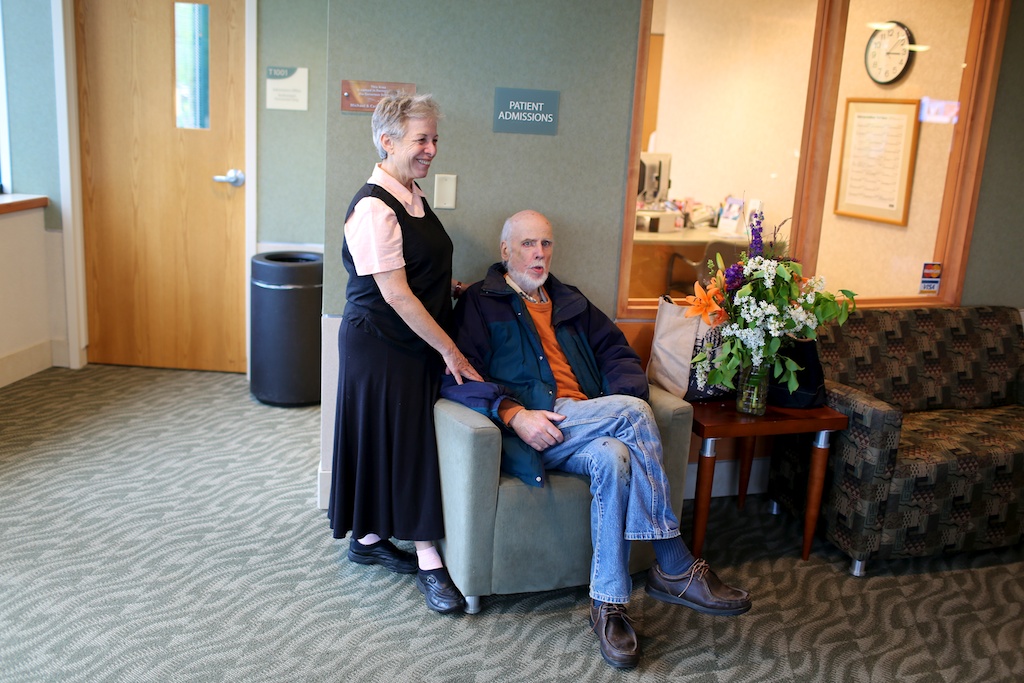
I’ve spent a lot of time in hospitals, as a reporter and a hospice volunteer. They are always challenging places to be and there are so many lessons of life to be learned in them. I came to visit my friend George Forss the photographer today and brought him some books and magazines as he told me he wouldn’t be released for a few more days. Just before I got there, he was told he would be released and when I arrived he was getting dressed, Donna was there, and a nurse handed him a thick folder filled with all kinds of instructions – prescriptions, notes on side effects, patient’s rights, doctor’s appointments, dietary concerns and restrictions, financial payment information.
I was nearly overwhelmed just listening to it, but I began instead paying attention to George and his long-time companion, the artist Donna Wynbrandt. Both of them have been through a lot – it is as heartbreaking a story as it is uplifting. Donna has had a difficult life, and George survived polio and life as a street peddler, in orphanages and foster homes. I was struck by how generous, patient and non-complaining they were when almost everyone else would have been complaining. George must have had a rough few days – the patient next to him was critical and George admitted he had gotten little sleep. He and Donna struggled to absorb the complex information they had just a few minutes to consider and would have to take hours studying.
The thing I have never liked about hospitals is how powerless individual patients can be, there is always the sense of a vast institution moving around individual people. Nobody seemed to be asking George how he felt about all these pills and instructions and appointments, things that will dominate his life, at least for awhile. It made me very uncomfortable to watch it. But George was not uncomfortable. Neither was Donna. He does not complain, whine or get angry. Neither does Donna, a practicing Buddhist.
While Donna worked through the bureaucracy in the pharmacy, George and I talked about a book I had given him, “The Americans,” by Robert Frank, a classic photography collection. He was eager to talk about the photos, not the hospital. Art is timeless, he said, it never gets old or irrelevant, and he wondered how Frank took some of his landscapes, just as so many famous photographers have wondered how George took his. Magical, really, sitting in that lobby, listening to the loudspeakers, sorting through paperwork, looking through photos, watching the wheelchairs go bye, listening to the sirens.
I thought there was something heroic about the two of them – George and Donna – the way they were so courteous, accepting, at ease and loving with one another. It was the most beautiful thing to see. I felt very inadequate next to it, small and petty. It would have been so easy to complain about the short notice for discharge, the paperwork, the complicated instructions for medicines and side effects, the warnings and reminders, the financial paperwork. People squawk about hospitals all of the time, and I was about to.
But they accepted all of it, it was just the way it was, the way it has always been, I could see, and always would be. Like bitching about gas prices or the cost of food. Both will always go up, yet we never stop complaining. George said the hospital was like a vacation for him. He was sorry he didn’t have the right equipment to get a shot of the big moon. He said his good luck had never failed him – he has had a lot of what many would call bad luck – and he said the instructions were no problem, he was good at absorbing and remembering things. He went in feeling awful and feels better, he said. He was nothing but grateful.
It was disorienting for me. Just yesterday I sat in the Park Slope Gallery with Maria and spent hours looking over his brilliant and astonishing work, a genius that seems forgotten by much of the world. He should, I thought, have been in a Brooklyn brownstone. In the south of France. In a Manhattan hospital suite. In a limo getting a ride home. With nurses and aides waiting to take care of him, give him his pills, feeding and caring for him. I worry about George. But George is not worried about George, and I have no right or need to be. He is in his life, every moment of it, and living it and honoring it with grace, humor and strength. There is no need to make him a struggle story, an object of pathos, any more than there is to see Rocky that way.
This kind of thinking, I saw, was my problem, not his, my issue, not his. It is the work I have to do that he has already done. I see that George can teach me a lot more than how to take a picture. He and Donna taught me a great deal this afternoon – about how to accept life and move graciously with it. How to live it, not fear it or get angry about it. I spent a few hours helping them get organized and discharged and then went shopping. A friend came to take them home.”You be safe,” George said to me as I closed the car door and they drove away from the lobby.
